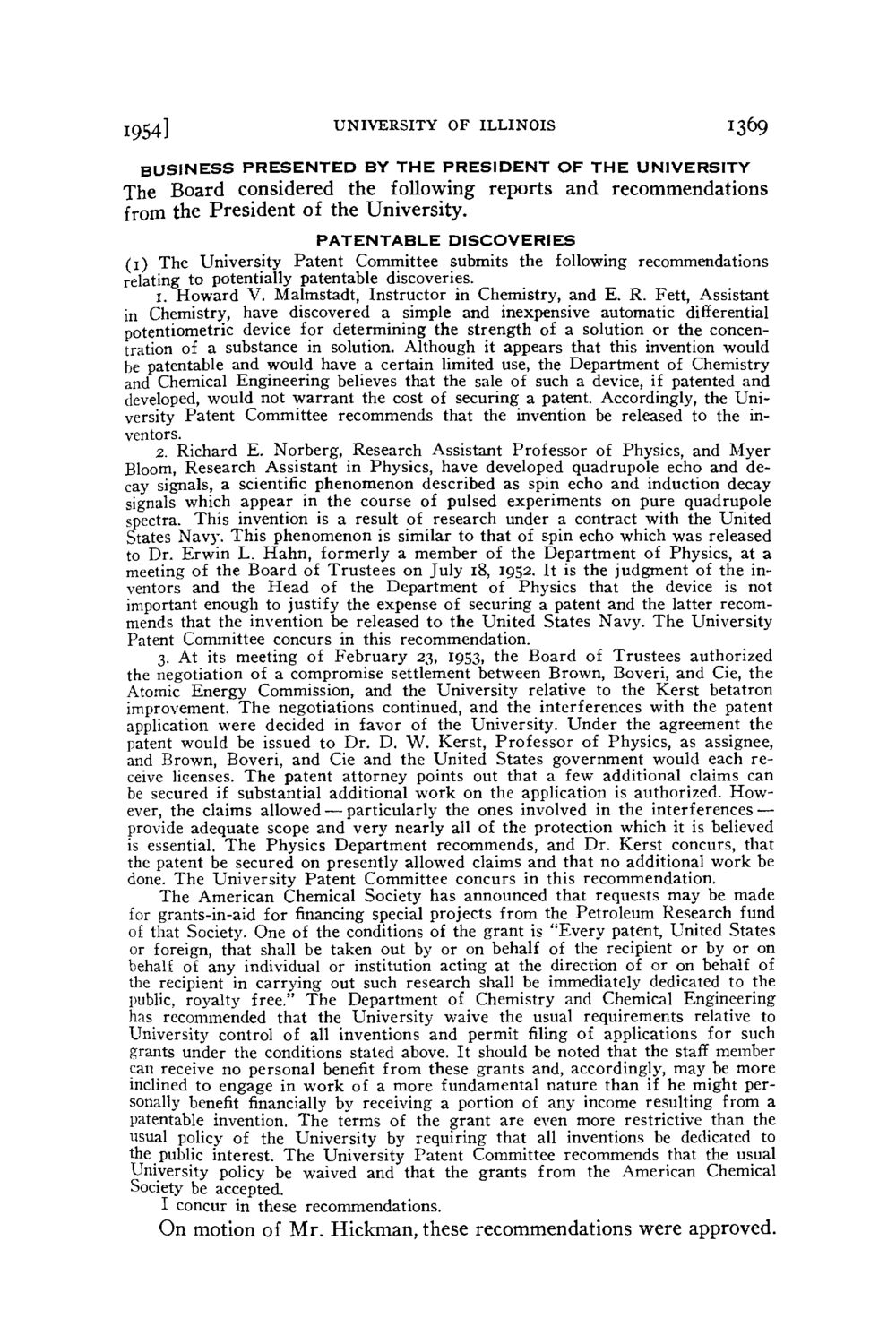| |
| |
Caption: Board of Trustees Minutes - 1954
This is a reduced-resolution page image for fast online browsing.

EXTRACTED TEXT FROM PAGE:
1954] UNIVERSITY OF ILLINOIS I369 B U S I N E S S P R E S E N T E D BY T H E P R E S I D E N T O F THE UNIVERSITY The Board considered the following reports and recommendations from the President of the University. PATENTABLE D I S C O V E R I E S (1) The University Patent Committee submits the following recommendations relating to potentially patentable discoveries. 1. Howard V. Malmstadt, Instructor in Chemistry, and E. R. Fett, Assistant in Chemistry, have discovered a simple and inexpensive automatic differential potentiometric device for determining the strength of a solution or the concentration of a substance in solution. Although it appears that this invention would be patentable and would have a certain limited use, the Department of Chemistry and Chemical Engineering believes that the sale of such a device, if patented and developed, would not warrant the cost of securing a patent. Accordingly, the University Patent Committee recommends that the invention be released to the inventors. 2. Richard E. Norberg, Research Assistant Professor of Physics, and Myer Bloom, Research Assistant in Physics, have developed quadrupole echo and decay signals, a scientific phenomenon described as spin echo and induction decay signals which appear in the course of pulsed experiments on pure quadrupole spectra. This invention is a result of research under a contract with the United States Navy. This phenomenon is similar to that of spin echo which was released to Dr. Erwin L. H a h n , formerly a member of the Department of Physics, at a meeting of the Board of Trustees on July 18, 1952. It is the judgment of the inventors and the Head of the Department of Physics that the device is not important enough to justify the expense of securing a patent and the latter recommends that the invention be released to the United States Navy. T h e University Patent Committee concurs in this recommendation. 3. At its meeting of February 23, 1953, the Board of Trustees authorized the negotiation of a compromise settlement between Brown, Boveri, and Cie, the Atomic Energy Commission, and the University relative to the Kerst betatron improvement. T h e negotiations continued, and the interferences with the patent application were decided in favor of the University. Under the agreement the patent would be issued to Dr. D. W . Kerst, Professor of Physics, as assignee, and Brown, Boveri, and Cie and the United States government would each receive licenses. T h e patent attorney points out that a few additional claims can be secured if substantial additional work on the application is authorized. However, the claims allowed — particularly the ones involved in the interferences — provide adequate scope and very nearly all of the protection which it is believed is essential. T h e Physics Department recommends, and Dr. Kerst concurs, that the patent be secured on presently allowed claims and that no additional work be done. The University Patent Committee concurs in this recommendation. The American Chemical Society has announced that requests may be made for grants-in-aid for financing special projects from the Petroleum Research fund of that Society. One of the conditions of the grant is "Every patent, United States or foreign, that shall be taken out by or on behalf of the recipient or by or on behalf of any individual or institution acting at the direction of or on behalf of the recipient in carrying out such research shall be immediately dedicated to the public, royalty free." The Department of Chemistry and Chemical Engineering has recommended that the University waive the usual requirements relative to University control of all inventions and permit filing of applications for such grants under the conditions stated above. It should be noted that the staff member can receive no personal benefit from these grants and, accordingly, may be more inclined to engage in work of a more fundamental nature than if he might personally benefit financially by receiving a portion of any income resulting from a patentable invention. The terms of the grant are even more restrictive than the usual policy of the University by requiring that all inventions be dedicated to the public interest. The University Patent Committee recommends that the usual University policy be waived and that the grants from the American Chemical Society be accepted. I concur in these recommendations. On motion of Mr. Hickman, these recommendations were approved.
| |